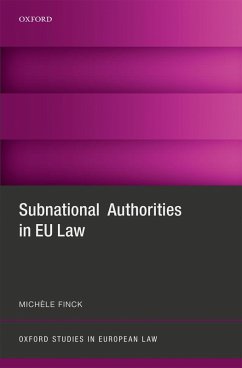This book explores the role and status of local and regional authorities (also referred to as 'subnational authorities' or 'SNAs') in European Union law, and reveals the existence of two parallel yet opposed constitutional imaginations of the supranational legal order. Through a survey of various areas of EU law, including primary and secondary legislation, case law as well as various soft law instruments, Finck introduces two narratives. These are the 'outsider narrative' and the 'insider narrative' that frame these constitutional imaginations. According to the outsider narrative, the structure of the legal order is bi-centric, composed of the member states and the EU only. This narrative envisages SNAs as outsiders of EU law, whose interactions with Union law are merely of an indirect nature. However, in addition to this well-known account of EU law, a parallel yet distinct narrative can be identified according to which SNAs are insiders that entertain direct relations with the European Union and contribute to the substantive development of EU law. It is illustrated that the coexistence of both narratives has wider implications as it points towards a shift in the structure of the European legal order itself, which is transitioning from bi-centricity to polycentricity.
Dieser Download kann aus rechtlichen Gründen nur mit Rechnungsadresse in A, B, BG, CY, CZ, D, DK, EW, E, FIN, F, GR, HR, H, IRL, I, LT, L, LR, M, NL, PL, P, R, S, SLO, SK ausgeliefert werden.









